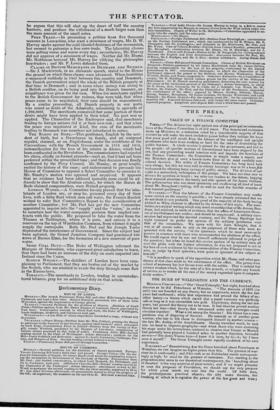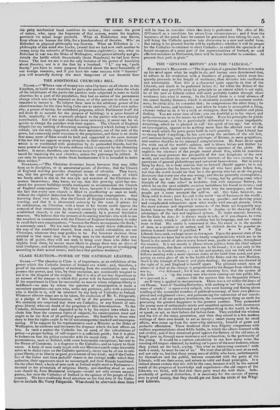THE DUKE OF WELLINGTON AND THE CURRENCY.
Monmixo Cuttorne LE.—" Our 'Great Untaught,' last night, knocked abou theories as he did Frenchmen at Waterloo. "The measure of 1826 (be
said) was not founded on any theory, but on experiencle, which the few last years had confirmed ; while that experience had proved the fallacy of an- other theory—a theory which stated that a paper currency was perfectly safe as long as it was convertible into gold. Experience, during the last few years, had proved this theory not to be true. It had likewise proved another theory not true—that theory, that one-pound notes and sovereigns could
circulate together.' What a rot among the theories His Grace has a com- pendious way of disposing of theories. He reminds us of another great warrior, who late in life chose to distinguish himself in another science— the late Mr. Astley, of the Amphitheatre. Having travelled much, he took into his head to improve geography—and when those who were executing his maps under his instructions, ventured to observe that Vienna or Munich had generally been placed a hundred miles in another direction' hewould answer= Put down Vienna here—I know it is here, by G—d ; for I have seen it myself." The Great Untaught seems equally confident of his own experience.
S rANDATCP.—.." Remembering how his Grace knocked about Frenchman at Waterloo, we can imagine no higher praise than this. The greatest of war- riors he is confessedly ; and if his rank as an Eidoloclast stands correspond- ingly as high, he must be the greatest of statesmen. Far, startling as the proposition may seem to our theoretical contemporary, the 'knocking about of theories' is the very exercise of great minds ; and if we might presume to scan the purposes of Providence, we should say the very purpose for which great minds are sent into the world. Of little men, the prudentpursne practical objects; the silly make theories, the breaking of which is to signalise the power of the few great and wise ; the petty mechanical head contrives its system ; then comes the great of nature, who, upon the fragments of that system, erects his trophies, pervincit via animi longe procedit. What an Eidoloclast was Bacon, from whom we borrow the title, for a knocker-about of theories. WiW an Eidoclast in physical philosophy was Newton. What an Eidoclast in philosophy of the mind was Locke, (would that we had now such another to sweep away the cobwebs of Scotch and German sophisters); nay, what an Eidoclast in war was the Duke of Wellington, who gained actually and glo- riously the battle which theoretically (teste Napoleon) he had lost three times. The last we see is not the only instance of his power of knocking about theories, nor is it the first by a hundred. " I," say we, pede fausto-," you have to some purpose knocked about the most formidable of our foreign enemies; and if you have the same success with " theories" you will assuredly destroy the most dangerous of our domestic foes.

























 Previous page
Previous page